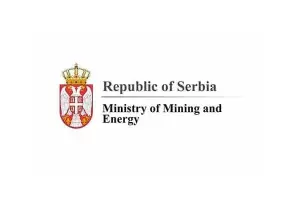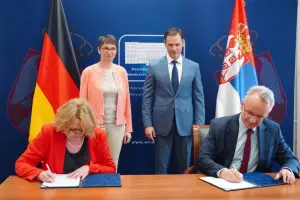- Serbia
Get to know Serbia
- Citizens
Culture and science
Health services
Pension and disability insurance
- Business
Employment
Economy
- Media
- Government
- Contact
Keep in touch
Contact form
Back
Keepin touch
Whether you have a question, comment, suggestion or any problem in the purview of the government, send us your message and we will try to respond as soon as possible. If your problem is not in our purview, we will forward your message to the relevant institution.
Q:
A:
Stable prices crucial for economic development
Belgrade,
16 February 2007
Governor of the National Bank of Serbia (NBS) Radovan Jelasic said tonight that NBS’ main task is to maintain stability of prices as European experiences showed that only stable prices can contribute to economic development.
Jelasic said in a round table called “Stable Currency for a Healthy Economy” organised by the Serbian government’s EU Integration Office that NBS’ goal is that base inflation in 2007 is between 4% and 8% and recalled that last year’s inflation of 6.5% was leveled with neighbouring countries.
High inflation is bad for economic growth and causes social problems as it does not result in increasing GDP and employment, the Governor said and added that only financial stability can help increase exports.
Head of the administrative committee of the Societe General Bank Goran Pitic confirmed that stability of prices is the best way to increase economic growth.
Pitic stressed that Serbia's goal is a stable currency in a health economy, adding that Serbia is now in a stability zone though it faces a new wave of reforms since the environment towards which strives is changing.
Vice-President of France's Vanci Group and former EU Commissioner for Monetary Issues Yves Thibault de Silguy, the euro sign's creator, said that the currency has indubitably succeeded since it has become a stability factor in Europe.
According to de Silguy, the euro enabled the stability of prices and low interest rates and raised global awareness of the competitiveness of companies from the euro zone by excluding differences in currency rates and abolished the costs of currency conversion. Therefore tens of billions euros were saved on annual basis, he added.
De Silguy also said that this currency is Europe's shield from financial crises since 60% of commerce is done among countries which use the euro, adding that it is therefore important to include Serbia in the EU.
High inflation is bad for economic growth and causes social problems as it does not result in increasing GDP and employment, the Governor said and added that only financial stability can help increase exports.
Head of the administrative committee of the Societe General Bank Goran Pitic confirmed that stability of prices is the best way to increase economic growth.
Pitic stressed that Serbia's goal is a stable currency in a health economy, adding that Serbia is now in a stability zone though it faces a new wave of reforms since the environment towards which strives is changing.
Vice-President of France's Vanci Group and former EU Commissioner for Monetary Issues Yves Thibault de Silguy, the euro sign's creator, said that the currency has indubitably succeeded since it has become a stability factor in Europe.
According to de Silguy, the euro enabled the stability of prices and low interest rates and raised global awareness of the competitiveness of companies from the euro zone by excluding differences in currency rates and abolished the costs of currency conversion. Therefore tens of billions euros were saved on annual basis, he added.
De Silguy also said that this currency is Europe's shield from financial crises since 60% of commerce is done among countries which use the euro, adding that it is therefore important to include Serbia in the EU.
-
 Belgrade, 21 July 2025
Belgrade, 21 July 2025Construction of oil pipeline with Hungary to begin early next year
-
 Belgrade/Athens, 17 July 2025
Belgrade/Athens, 17 July 2025Serbia continues to align with EU in field of energy
-
 Kostolac, 14 July 2025
Kostolac, 14 July 2025First solar power plant Petka in Kostolac put into trial operation
-
 Belgrade, 11 July 2025
Belgrade, 11 July 2025Potential for improving cooperation with Belarus in many areas
-
 Požega, 5 July 2025
Požega, 5 July 2025Section of Pakovraće - Požega highway officially opened
-
 Belgrade, 2 July 2025
Belgrade, 2 July 2025Technical specifications defined for Serbia-Hungary oil pipeline
-
 Belgrade, 30 June 2025
Belgrade, 30 June 2025IMF confirms Serbia successfully implementing all agreed reforms
-
 Belgrade, 27 June 2025
Belgrade, 27 June 2025Double Taxation Avoidance Agreement with Germany signed
-
 Kostolac, 25 June 2025
Kostolac, 25 June 2025Construction of Kostolac wind farm nearing completion
-
 Belgrade, 24 June 2025
Belgrade, 24 June 2025Government supports request for new postponement of sanctions against NIS
